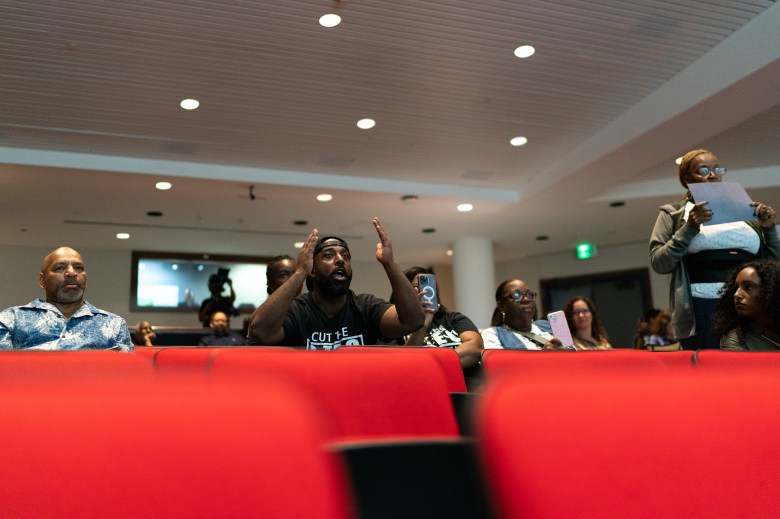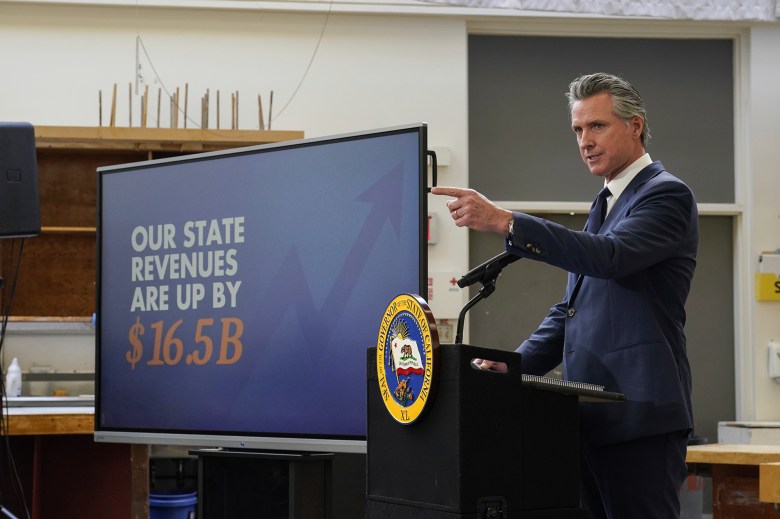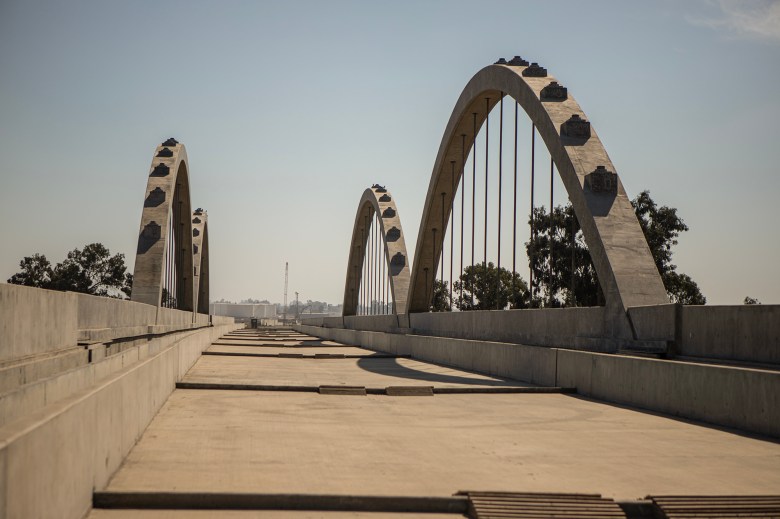
After two reparations bills stalled in the final day of session last year, reparation advocates are campaigning today at the state Capitol to drum up support for the same measures.
In partnership with the Coalition for a Just and Equitable California, the advocates are calling the rally “the first reparations advocacy day” in state history. The event’s lead organizer, Chris Lodgson, said they want lawmakers to introduce, support and adopt “bold” reparation bills — including the ones the coalition are prioritizing.
- Lodgson: “People are still mad about the bills that did not get to the governor’s desk last year … and we’re looking forward to success in 2025.”
The two stalled bills weren’t part of the 14-bill reparations package championed by the California Legislative Black Caucus last year: One would have created a new state agency, while the other would have created a fund for reparations policies.
But the caucus, which sought a less sweeping approach in the face of public backlash, prevented the proposals from coming to a vote in the Assembly — a move that upset advocates. Gov. Gavin Newsom ultimately signed five of the 14 bills.
The coalition is also pushing for proposals to allocate $30 million in the 2025-26 state budget to fund the state agency; create a guaranteed income program for senior residents who are descendants of slaves; and compensate Black families who had their property seized through “racially motivated” eminent domain (a proposal Newsom vetoed last year).
But similar to 2024, advocates have a tough road ahead. Reparations in the form of cash payments are politically unpopular, and the Legislature has been warned against new spending amid a budget crunch.
Still, supporters are hopeful. Lodgson said last year’s defeats convinced advocates to take “bigger” actions and reach out to other potential allies.
- Lodgson: “The Black Caucus should not ‘own’ all the reparations activity legislatively. We’re looking to work outside the Democratic Party quite frankly. Folks in both parties need to take the lead on this, and we’ve been talking to the Republican Party too.”
Get CalMatters text alerts: We can send you our latest investigations, election coverage and more, and you can send us story tips, comments and feedback. Sign up here.
Other Stories You Should Know
Calling all budget nerds 

From CalMatters’ Mikhail Zinshteyn:
California is on pace to see a “modest” surplus and avoid a deficit because it’s banking $16.5 billion in additional revenue above what was projected last June, Gov. Newsom told reporters Monday in a preview of the state’s budget picture.
Newsom’s office will formally unveil the 2025-26 budget on Friday, kicking off a six-month process of negotiations and legislative meetings before top Democrats in the Assembly and Senate strike a deal with the governor sometime in late June.
Newsom predicts that more money is heading to the state budget. The state’s main spending account, the general fund, is projected to hit $229 billion in 2025-26 — about $10 billion more than what his office and lawmakers predicted last June and $17 billion more than what’s in this year’s budget.
Wondering what else is in the budget? So are we! Join our same-day coverage Friday when the details go live sometime in the morning.
Rail project continues forward (slowly)

From CalMatters’ Sameea Kamal:
What does a second Donald Trump administration mean for the High-Speed Rail project?
Newsom commented briefly during a groundbreaking in Kern County Monday: “No one’s naive about the headwinds coming our way. But we withstood those a few years back and we were able to continue to move forward.”
While the Biden administration infused $6 billion into the project, the incoming Trump administration has once again set its sights on California’s overdue, over-budget High-Speed Rail. During his first term, Trump axed $1 billion in federal funding for the project.
Earlier today, Republican Congress member Kevin Kiley, from Northern California, introduced a bill to curtail further state funding.
Newsom acknowledged the delays, but also touted some of its recent progress: The project’s final environmental review was approved last June.
He said the administration was “months away from making some early commitments on train sets,” but still “a couple of years away” from laying tracks.
Voters approved a $10 billion bond back in 2008 to launch the project, which was supposed to have 800-miles up and running by 2020 and cost a total of $40 billion to create a train running from San Francisco to Los Angeles in under three hours. The project is now expected to cost, at best, between $88 and $128 billion.
And lastly: First US bird flu death

Nearly three weeks after Gov. Newsom issued a state of emergency in California over the bird flu, the Centers for Disease Control and Prevention reported the first death in the U.S. due to the virus Monday. Find out where.
Other things worth your time:
New CA law prohibits using AI as basis to deny health insurance claims // The Mercury News
Inside the federal government’s efforts to break up Google // Los Angeles Times
Skyrocketing egg prices devastate CA restaurants // SFGATE
Will CA’s power grid keep running smoothly? // The San Diego Union-Tribune
What rights do immigrant students have in CA schools and colleges? // EdSource
Barbara Lee files paperwork to run for Oakland mayor // The San Francisco Standard
Powerful, dry winds to raise wildfire risk across Southern CA // AP News
A lack of wastewater testing is blinding the Central Valley to its bird flu problem // Los Angeles Times
H-1B visas are polarizing the right: Why that matters for the Bay Area // San Francisco Chronicle


